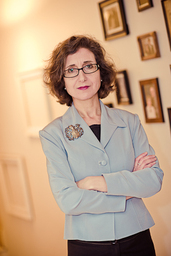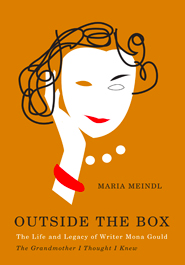 Maria Meindl Photo by Kathryn Palmateer Maria Meindl is the author of Outside the Box: the Life and Legacy of Writer Mona Gould, the Grandmother I Thought I Knew from McGill-Queens University Press, a story “The Last Judgment” from Found Press and “Rules” an essay in an anthology on death published by Creative Non Fiction. Her essays have appeared in The Literary Review of Canada, Descant and Musicworks. She has made two radio series for CBC Ideas: Parent Care, and Remembering Polio. She is the founder of the Draft Reading Series (now in its seventh season) which features work by new and established writers. Maria Meindl has two London readings this week: The University of Western Ontario November 23, 2011 @ 12:00pm to 1:00pm, North Campus Building, 2nd Floor room 295 Fanshawe College November 24, 2011 @ 2:00pm to 3:00pm, Room D1060, 1001 Fanshawe College Blvd. RUSTY TALK WITH MARIA MEINDL Kathryn Mockler: How did you first come to writing? Maria Meindl: As a small child I spent a lot of time with my grandmother, who had been a well-known poet, journalist and broadcaster from the 1930s to the 1950s. Right around the time I was born she was disappearing from the public eye. She felt hurt and bitter about it and planted all her hopes on me. It was a given that I would follow in her footsteps. It never occurred to me that I had a choice. At the age of eight I wrote a poem, which felt like it came to me by divine inspiration. My grandmother said it was a tour-de-force, my teacher praised it as “sensitive,” and a lifetime of literary misery was born. I felt I had to fulfill my destiny as a writer, yet I gave myself no room to experiment, no permission to fall on my face. Furthermore I was a one-trick “sensitive” pony; anger, sexuality, clear and incisive thought all fell outside my very limited range. Oh, and tyrannized by that “divine inspiration,” I was afraid to roll up my sleeves and rewrite anything. It took years--and I mean years--to get over it. I started writing at the age of eight and published my first book, Outside the Box, this September at the age of 52. By the way it’s about my grandmother and our relationship. KM: What keeps you going as a writer--especially when you are working on a project that is years in the making? MM: I’m a very, very determined person, and I hate to give up. It’s in my nature, or deeply conditioned. I should say that this is not a healthy quality in most circumstances. If you only knew the horrible relationships and bad jobs I have spent years trying to “fix”! For my emotional and physical health, I have had to learn to turn my tenacity off at times and cut my losses, but it is a strength when it comes to writing, especially when your projects take twelve years to finish. (This was the case with Outside the Box.) I should also say I think that tenacity can be learned if you don’t have it. KM: What is the writing process like for you? Is it different when you are writing in different genres? MM: For Outside the Box, all the fraught history with my grandmother seemed to infuse the process I felt like my brain was bleeding most days when I’d been working on it, and this went on for years. But I got through it. Lately I have also been writing fiction. A totally different experience. It is joyful, though all writing comes hard to me and fiction is no exception. This may be because in the past few years I have been exploring movement and voice. I don’t feel a direct link with the writing process, but I do feel my writing has become more embodied, sexier and more fun. Also I am less cautious and more direct in the way I say things. KM: How do you approach revision? MM: I am much better about revision than I used to be. Once I get past my usual “oh my God it isn’t perfect!” panic I enjoy it. It’s oh so satisfying to dig into the richness of the initial draft and feel it transform into something more evolved. It also helped to take a philosophy degree as a mature student. We would critique each other’s papers minutely, but there was something good-natured and co-operative about the process. In that context, it’s known that by critiquing someone’s work, you help them reinforce their argument because you help them anticipate what others might say. When I applied this to creative writing the whole process got easier. Now I consider any and all critiques, no matter how they are presented. I have had some wonderful editing, especially on Outside the Box, but I’ve endured a lot of pure, unconsidered meanness over the years, and I’m sure it’s not over yet. I don’t care any more. If the editor can’t be diplomatic, it’s not my problem; meantime, the work improves, and I get the credit anyway. KM: How did you deal with rejection when you first started out? MM: Um, how about now? I am and have always been devastated by rejection. I take it personally, and it brings up painful rejection issues from my past. It’s getting worse and not better with time. However…I don’t let that stop me! My method is as follows: when something is rejected, I stop working and go into mourning for 24 hours. I allow myself to be overwhelmed with my darkest self-doubts. I resolve to quit. Next day, I consider the editor’s comments carefully (if I’ve been lucky enough to get them). I make changes if necessary. Then I put it BACK IN THE MAIL. I wrote a story in 1986 called “The Last Judgment.” I began submitting it to literary magazines. It was rejected about 20 times, always with the comment that it was too long. Each time I was flattened. I kept sending it. Last year it was accepted by Found Press, which does really good and innovative e-publications, and which treats short stories like books, with all the attendant publicity and marketing (and an advance). It was the ideal length for Found Press. KM: What authors or books would you recommend, especially to creative nonfiction writers? MM: I have read some great Canadian nonfiction. Recent favourites have been The Year of Finding Memory by Judy Fong Bates, The Boy in the Moon by Ian Brown, anything by Marni Jackson. I was very affected by Dreams from My Father by Barack Obama: such a beautifully written book and an ideal balance between anecdotes and thoughtful analysis. Also, I keep returning to Silences by Tillie Olsen--not only for the content but the unique structure. KM: Do you have a piece of advice for new writers? MM: The literary community needs you, NOW, no matter how inexperienced, awkward, over-committed or downright weird you think you are. I have run a reading series (Draft) for seven years now and our volunteers are like gold. We cannot do without them, and we always need more. Get involved with something--publications, events, or whatever you like. Or start something. The big established organizations we have now began with a few people who gathered together in a basement or departmental lounge of their university and made things happen. They made mistakes and learned along the way. You will have a lot more fun and the more people who do this, the bigger, more welcoming and more diverse the literary scene will be. KM: Your funniest literary moment, if you have one? MM: My authors’ copies of Outside the Box were delivered on the front porch at one and the same moment as the earthquake in Toronto August 23, 2011. KM: What are you working on now? MM: I’m writing a series of three novels working back through history from 1980s Toronto to post-WW2 London to Weimar Berlin. Isn’t it nice that I’ve got over putting too much pressure on myself?  MARIA MEINDL'S RECENT BOOK Outside the Box, McGill-Queen's University Press, 2011 Description from McGill-Queen's: When poet and broadcaster Mona Gould died in 1999, she left behind thirty-eight boxes of papers. Her war poem, "This Was My Brother," was still a staple of textbooks and anthologies, yet Mona - well known in her youth - had fallen into obscurity in the 1960s. Born at the very time Mona's career was faltering, Maria Meindl became a captive audience for her grandmother's extravagant stories of the past. Years later, Maria took on the daunting task of sorting through Mona's mountain of papers to create an archive for the University of Toronto's Fisher Rare Book Library. The chaotic state of the boxes reflected Mona's flamboyant and demanding personality, yet they also drew an important picture of the life of a Canadian freelancer in the twentieth century. Mona had begun publishing poetry and features in newspapers in the 1920s and published three books of poetry in the 1940s. In the 1950s, at a time when many women were retreating from the public sphere, she had a successful radio career. Her later journals and letters recount, in agonizing detail, a downward spiral into self-doubt, poverty, and addiction. Maria soon discovered that the truth of Mona's life was even more fascinating than her stories. Outside the Box brings to life a thinly documented era in Canadian letters through the story of one passionate and conflicted woman. It also charts the journey of an unwilling archivist, coming to terms with family secrets, forgotten history, and the stories that are never told. Review quotes "Not content merely to provide an account of Gould's life and times, Maria Meindl probes the complexities of her own relationship with this remarkable woman. I thoroughly enjoyed this book and found it rewarding on multiple levels." Susan Olding, author of Pathologies: A Life in Essays "Encompassing literary, social, and women's history, personal memoir, and media studies, Outside the Box is honest, revealing, and original." Elaine Kalman Naves, author of Shoshanna's Story |
Rusty Talk
Rusty Talk Editor: Archives
November 2017
Categories
All
|

 RSS Feed
RSS Feed
